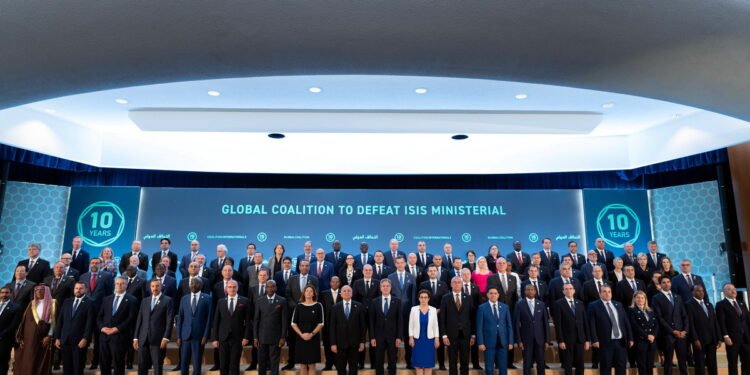
The ever-evolving threat posed by ISIS-Khorasan (ISIS-K) was a key focus of the recent Global Coalition to Defeat ISIS Ministerial (D-ISIS Ministerial) meeting, with US officials spotlighting Somalia as a critical node in the group’s global operations.
Special Envoy for the Global Engagement Centre, James Rubin, took time out of a packed agenda to stress that ISIS-K’s external operations have escalated in both scale and sophistication, posing a significant threat despite efforts to disrupt their activities in Europe and the West.
“ISIS-K’s media cooperation with affiliates like ISIS-Somalia is a hub for the group’s operations in Africa,” Rubin explained, adding, “Somalia’s importance to ISIS is underscored by the group’s overall leader residing there.” He noted that ISIS-Somalia supporters use often unofficial media outlets, produce propaganda in multiple languages aimed at engaging current partners while recruiting new ones—a strategy that underscores Somalia’s crucial role within ISIS.
The propaganda machine, according to Rubin, is a key weapon in ISIS’s arsenal, allowing it to manipulate information and expand its influence well beyond the battlefield. Rubin emphasized that the true nature of these armed groups must be understood, referring to how ISIS-K and ISIS-Somalia frequently collaborate with ideological enemies, countering the facade they project in their messaging.
Rubin also confirmed that in late May, the US military successfully targeted the global leader of ISIS-Somalia in a precision airstrike, reinforcing America’s continued focus on counterterrorism efforts in East Africa. This high-level strike was part of broader coalition efforts to dismantle leadership nodes while addressing the extensive manipulation of information used by ISIS-Somalia and other ISIS branches.
Rubin’s remarks were part of a broader conversation, responding to questions by State Department and White House Correspondent Pearl Matibe, on how ISIS groups exploit information environments across Africa, with ISIS-Somalia playing a significant role. “Propaganda produced by ISIS-Somalia not only helps them sustain their current alliances but also reaches out to win over new supporters,” Rubin noted. The use of multilingual media—targeting diverse audiences—has been a critical component of ISIS-Somalia’s approach, and with the group’s central leader based in Somalia, their media presence is only expected to grow.
Meanwhile, the continued presence and activities of al-Shabaab, an Al-Qaeda affiliate, complicates the region’s security landscape. Rubin stressed that understanding the connections between these terrorist organisations, including al-Shabaab’s relationship with Iran-aligned groups, is critical to the success of counterterrorism strategies.
On the African front and expanding partnerships, Deputy Special Envoy to the Global Coalition, Ian McCary, highlighted the coalition’s strategic focus on Africa, pointing out both the opportunities and challenges the continent presents. In his one-on-one conversation with Matibe, McCary emphasised the critical need to strengthen partnerships with countries in coastal West Africa and the Sahel, where instability has surged amid a wave of military coups.
“The coalition has been focused on building partnerships in coastal West Africa, also with the Sahel, although the coup situation has made that a lot more challenging,” McCary explained. He pointed to the growing interest among coalition members in preventing the spread of instability southward into more stable countries, noting that the Sahel region—stretching from Mali and Burkina Faso to Tunisia—has been increasingly volatile.
“There’s this belt of instability, and we are working hard to ensure it doesn’t spill over into the countries of coastal West Africa,” McCary continued, emphasising the importance of maintaining “a firewall or a bulwark” to contain extremist movements. He highlighted ongoing cooperation with Mauritania, Togo, and Ghana, describing these bilateral relationships as key to the coalition’s success in Africa.
In discussing recent successes, McCary and a senior State Department official familiar with counterterrorism operations drew attention to Kenya’s counterterrorism achievements. The US-backed Priority Terrorism Task Force has been instrumental in boosting Kenya’s ability to respond to terrorist threats, offering a possible model for other nations in Africa grappling with extremist violence.
“Kenya’s efforts have provided a successful blueprint for boosting national security through targeted counterterrorism initiatives,” the State Department official noted, stressing that similar frameworks could be expanded to other regions facing heightened ISIS or Al-Qaeda activity.
The conversation with Matibe also touched on how ISIS and its affiliates continue to exploit technological advancements to fuel their operations. Martyn Warr, head of the UK’s Counter Daesh Communications Cell, offered a sobering view on the persistent digital threat posed by ISIS. “Daesh is a very clever animal,” Warr remarked. “Their ability to use social media and get into the heads of their audiences is unparalleled. This has unfortunately allowed them to penetrate deeper into societies than any other terrorist organization.”
Warr warned that Daesh’s ability to adapt to new technologies and exploit shifting circumstances should not be underestimated. “We must operate on the assumption that they will continue to adapt and use technology against us,” he said. Warr’s comments underscored the importance of sustained efforts to combat ISIS’s media and online strategies, which remain integral to their broader operations.
As the coalition continues to evolve its approach to countering ISIS, particularly in Africa, the challenges ahead remain complex. Rubin, McCary, Warr, and the other officials were clear in their messaging: ISIS’s ability to manipulate information and technology is as dangerous as their battlefield operations, and the group’s spread across Africa demands a coordinated, multifaceted response. From airstrikes targeting leadership figures to bolstering information warfare defences, the Global Coalition to Defeat ISIS is ramping up efforts to adapt to the threat—both online and on the ground.
Pearl Matibe is a Washington, DC-based foreign correspondent, and media commentator with expertise on US foreign policy and international security. You may follow her on Twitter/X: @PearlMatibe










